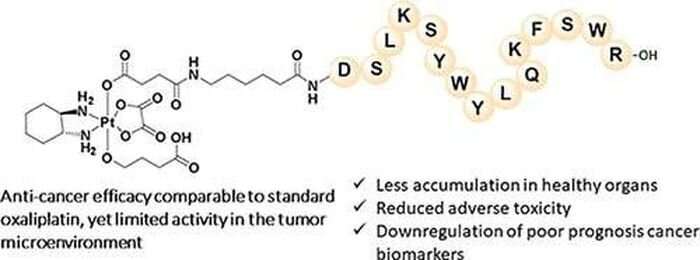This article has been reviewed according to Science X's editorial process and policies. Editors have highlighted the following attributes while ensuring the content's credibility:
fact-checked
peer-reviewed publication
proofread
Validation of a therapy that overcomes chemotherapy resistance in colon and rectal cancer

A multidisciplinary team made up of doctors and scientists from the Hospital del Mar Medical Research Institute (IMIM-Hospital del Mar) and the Institute for Research in Biomedicine (IRB Barcelona) has led a study, recently published in the Journal of Medicinal Chemistry, that proposes a therapeutic approach for preventing the development of resistance to chemotherapy with oxaliplatin, one of the standard treatments for colon and rectal cancer. The work, which also involved doctors from the Pathological Anatomy and Medical Oncology departments at Hospital del Mar, as well as researchers from the University of Oviedo and the CIBER on Cancer (CIBERONC), is another step toward personalizing the therapeutic approach to cancer.
In a previous study published in Nature Communications, this group had already shown how this type of chemotherapy accumulates in the healthy cells surrounding the tumor, the fibroblasts. This causes the activation of a number of genes linked to poor treatment response and tumor progression, which stimulates the tumor environment and helps tumor cells that have survived chemotherapy to proliferate once again. To prevent this, the authors of the new study propose adding a cell-penetrating peptide to oxaliplatin.
"Converting a systemic treatment, which affects healthy organs and the tumor microenvironment, by adding this peptide, allows us to transform it into something more specific, a targeted therapy, taking us closer to personalized medicine," points out Dr. Alexandre Calon, a researcher at the IMIM-Hospital del Mar and co-leader of the study.
The conclusions are based on the analysis of tumor samples from nearly 200 colon and rectal cancer patients. In addition, ex vivo samples of tumors from mice and patients were analyzed to show that adding a specific peptide to oxaliplatin reduced the adverse effects of this chemotherapy drug on normal tumor cells and could therefore reduce resistance to this treatment.
The results indicate that platinum accumulation in the tumor microenvironment in mice treated with this new approach drops dramatically and is up to 3.5 times lower. "We have seen that the chemotherapy load is reduced in fibroblasts treated with the new compound compared to those treated with oxaliplatin. This reduces the possibility of inducing tumor cell treatment resistance," explains Dr. Calon. It is therefore important to bear in mind that "Cancer does not just involve tumor cells, but there is also a microenvironment made up of blood vessels, fibroblasts and immune system cells, which are there to structure the tumor."
The researchers also determined that the new drug not only accumulates less around the tumor in mice, but also in the organs that are normally most heavily affected by chemotherapy, such as the colon itself, the kidneys and the liver. In this sense, as Dr. Jenniffer Linares, a researcher in the same group and first author of the study, explains "The classic treatment has a series of side effects on the patient, which we think could be reduced with the new drug, as less platinum accumulates in healthy tissues."
"This study is a crucial first step for the future clinical development of treatments that cause fewer side effects and are more effective in patients with colon and rectal cancer, taking into consideration the fact that the normal cells involved in tumors play a key role in treatment efficacy," explains Dr. Clara Montagut, head of the gastrointestinal tumor unit at the Hospital del Mar and a CIBERONC researcher.
These findings prompted Dr. Daniele Lo Re, who co-led the study, to observe that "By chemically modifying the structure of oxaliplatin, we can modulate its activity in the tumor microenvironment without any loss of efficacy. From this point on, we can think about integrating this approach into drug discovery processes, using appropriate cellular models that allow us to validate a greater number of potential new drugs both in the tumor and in its microenvironment."
More information: Jenniffer Linares et al, Peptide–Platinum(IV) Conjugation Minimizes the Negative Impact of Current Anticancer Chemotherapy on Nonmalignant Cells, Journal of Medicinal Chemistry (2023). DOI: 10.1021/acs.jmedchem.2c01717




















